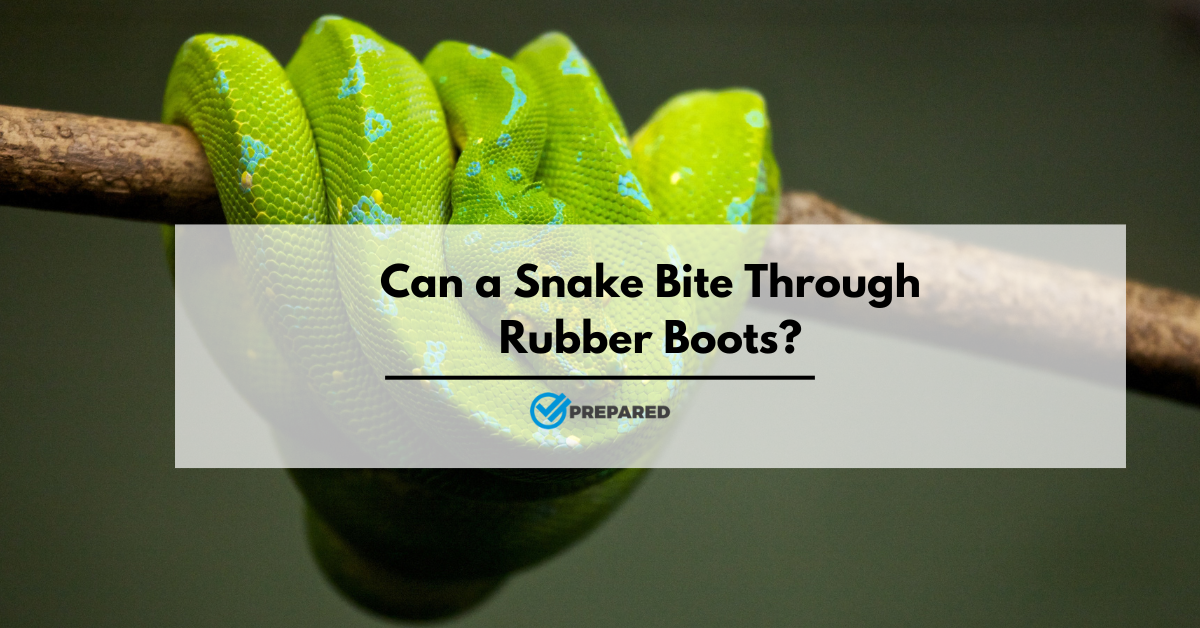Rubber boots come in handy for several reasons; whether for the rain, to walk through the mud and puddles, to work in chemical plants, or to trek through the forests. So you may think that these boots can protect you from snake bites. But what if you’re wrong?
So the question arises, can a snake bite through rubber boots? Rubber boots may protect you from some snakes, but they may not be enough in all cases. Besides, the length of the boots and the materials matter as well.
This article discusses all that you need to know to protect yourself against snake bites with boots.
Can Rubber Boots Protect You From Snake Bites?
Rubber is a very sturdy material. While rubber boots are designed to protect you from a lot of things, they may not be able to protect you from snake bites all the time. However, the chances of snake bites are slim unless you’re walking by a snake habitat or there are snakes around your home.
For any pair of boots to protect you, including rubber boots, their height needs to be up to the knees or higher if possible. If they’re no higher than the calves or you have most of your lower legs exposed, then they won’t protect you from snakes most of the time.
What to Do if a Snake Bites Through Your Rubber Boots?
If a snake has bitten your boots, try to feel if its fangs have touched your skin. If not, wash the boots’ bitten place thoroughly with water. However, if the fangs have penetrated through your rubber boots and particularly into your skin, you should seek an urgent medical emergency.
- Take off your boots carefully;
- Call an ambulance or emergency care immediately;
- Apply a pressure immobilisation bandage and splint;
Bites from venomous snakes will cause severe pain, discoloration, and enlargement of lymph nodes at the bite site. An antivenom and other treatments may help you get cured.
Is It Worth Investing in Rubber Boots?
Rubber boots aren’t just for protection from snakes; people working on farms and in hazardous industries need to wear rubber boots to protect themselves from unfortunate accidents. For cases like these, it’s worth investing in rubber boots.
However, if the rubber boots aren’t very thick or layered enough, they won’t protect much from the venomous bites of snakes. You also need toe protection, as some snakes target low spots. For such snakes, you should invest in snake-proof boots.
Besides, even if the rubber boots are knee-high, some snakes reach higher than the knees. So these boots won’t be of much protection there.
How Effective Are Snake-Proof Boots?
While snake-proof boots can’t guarantee you a hundred percent protection, they’re designed to protect you from most snake bites. To ensure you get the most out of your snake-proof boots, buy good quality ones and check their design carefully.
What Are Snake Boots Made of?
Invest in good quality snake-proof boots no matter how frequently or rarely you use them. They can vary in quality, depending on where you buy them. Look for sturdy yet comfortable boots and how well they’ll protect you from even the Gaboon viper.
Good quality snake-proof boots are made from a mix of rubber and neoprene, with an inner lining of tight-knit impenetrable materials like Kevlar, leather, and synthetic weaves. These make it hard for even the strongest fangs to penetrate through the boots and bite through your skin.
Some snake boots have a sturdy piece of wood to cover the toes against bites, which you should highly consider. No matter how sturdy the boots are to forfeit snake bites, they should still be flexible enough so that you can move freely. Besides, they should be long enough to cover your knees.
How High Can a Snake Strike You?
Some snakes like attacking their targets from the ground, on your toes, ankles, and calves. Some species will attack you pretty high up. Some other species can shoot up and bite you on your fingers, thighs, or waist! It often depends on the breed of the snake.
Venomous snakes don’t usually bite humans. However, they aren’t smart enough to differentiate, so they can end up attacking you as a defensive response or when you accidentally step on one of them.
What’s the Difference Between Snake Boots and Rubber Boots?
The main difference between snake-proof boots and rubber boots lies in the materials used to make them. Let’s see the differences between the two types of boots:
| Snake-Proof Boots | Rubber Boots |
| They’re made specifically to protect from snake bites. | They’re manufactured for a wide range of uses. |
| They’re made from a combination of rubber, leather, polyurethane, and neoprene. The inner layers are made from tight-knit materials to stop even the strongest snake bites. | They’re made from either natural rubber or polyvinyl chloride (PVC). |
| The boots are thick enough to stop strong snake bites. | They can’t prevent all snake bites but are strong enough to block the bites of non-venomous and small snakes. |
What Other Boots Can Protect You From Snake Bites?
Apart from rubber boots and snake boots, cowboy boots also turn out to be effective against snake bites. Thick leather cowboy boots can stop most of the snakes from biting through the boots and penetrating the skin with their venom.
Knee-high hunting boots are also a great option, especially waterproof ones. They are specifically made to be worn in jungles, where you need to step on muddy grounds, puddles, and shaded cool areas that can be territories for snakes.
Can All Snakes Bite Through Your Boots?
No, not all snakes will be able to bite through your boots unless your boots aren’t made of tough materials or the snake fangs are strong enough to pierce through rigid materials. That being said, you should be careful of rattlesnakes and vipers, as they have powerful fangs.
Usually, snakes come out when the temperatures are sweltering, especially during spring and summer. They are very territorial, which means they’ll attack you if you invade their territory, even if you don’t mean any harm.
How Long Are Snake Fangs?
Snake fangs can vary in size and strength, depending on the species and how venomous a snake is. Highly venomous species, such as vipers, usually have the longest and strongest fangs. The Gaboon viper, for example, has fangs close to two inches long, which is the longest!
Keep in mind that non-venomous snakes don’t have fangs. They have very sharp and long teeth that look similar to fangs but are much smaller, which is why their bites aren’t as powerful as those of venomous snakes.
Conclusion
Whether you want to buy boots specifically for going hunting or catching snakes, or just going for a hike, you need to weigh your chances of encountering venomous snakes on your way. You can invest in thick rubber boots if you don’t want to spend much on snake-proof boots.
We hope you found all the information in this article helpful to help you decide which boots to buy and whether rubber boots can stop snakes from biting through.

James is an outdoor enthusiast and freelance writer on various outdoor, survival and camping topics.

